When it was announced last November that Hynes Charter School would be partnering with the University of New Orleans (UNO) to open a new K-8 campus in fall of 2019, district officials portrayed the move as part of their broader mission to expand access to the city’s highest-performing schools.
“We are very thankful to see this partnership come to fruition as a way to expand our high-performing schools to other families in the city,” Orleans Parish School Board (OPSB) Supt. Henderson Lewis said in a statement on the expansion. “Not only will this partnership help us achieve our goal of increasing the number of students attending ‘A’ and ‘B’ schools, but it will also give our students an incentive to strive in higher education.”
But what Lewis never mentioned is that the children of UNO employees will be granted an enrollment preference at the new school, meaning that the University of New Orleans will be given open seats at one of the city’s most sought-after public schools to use as a perk for current and prospective faculty members.

In fact, officials from both OPSB and Hynes have conspicuously avoided any discussion of the admissions preference plan, most likely because they know that many community members (myself included) would view this arrangement as a betrayal of the district’s professed commitment to provide equitable access to schools. Instead, they’ve apparently decided to pursue a strategy of silence and obfuscation in the hopes that the deal between Hynes and UNO would fly under-the-radar.
And for a while, at least, the approach seemed to work. Local news stories on the Hynes expansion announcement were uniformly positive, echoing the message that the new campus would open up more seats for families seeking a spot at the A-rated school. Meanwhile, none of the coverage addressed the fact that the children of UNO employees would be given an edge in the admissions process, as reporters were kept in-the-dark about the plan.
The full story only recently came to light thanks to reporting from WWL’s Caresse Jackman, who learned about the admissions preference after UNO administrators sent out an email in late-January to faculty and staff which said that children of university employees who live in Orleans Parish would be given priority in enrolling at the new school.
In a statement to WWL, Hynes CEO Michelle Douglas acknowledged the school was discussing a possible enrollment preference with UNO, but insisted those conversations were still in their early stages:
“Hynes is exploring the possibility of a community partnership with the University of New Orleans in the opening of our new school, which includes locating our facility on UNO’s Campus. We are in the preliminary stages of planning and will follow the letter of law allowed in all aspects of the partnership. We will provide information to the public as soon as we are able.”

Truth vs. Lies
However, internal UNO documents, which I obtained through a public records request, show that Douglas’ statement to WWL was a lie. (It should also be noted that she is currently slow-walking a public records request that I submitted to Hynes.)
While Douglas maintained that plans with UNO were still in the “preliminary stages,” these documents show that Hynes had already finalized a partnership agreement with the University of New Orleans.
On January 25th – the day after Jackman’s story aired on WWL – UNO president John Wicklow sent a letter to the head of the Board of Supervisors of the University of Louisiana System (of which UNO is a part) requesting approval of an memorandum of understanding with Hynes. In the attached M.O.U., Hynes agreed to give “a fifteen (15%) percent enrollment preference for dependent children of permanent employees of UNO.” In exchange, the university would grant Hynes a long-term lease (at a cost of $1 per year) for a parcel of land on their Lakefront Campus where the new school will ultimately reside.
Other public records make clear that an admissions priority for UNO employees was part of the plan from the very beginning. In September 2017, more than a year before the Hynes expansion was officially announced, a “Feasibility and Concept Analysis” of the UNO-Hynes partnership was developed for the university by Dr. Rose Drill-Peterson. In her report, Drill-Peterson suggested that UNO and Hynes seek an enrollment preference for children of UNO employees, as well as a preference for families residing within the 70122 zip code.
Later, under a section entitled “Political Threats and Challenges,” Drill-Peterson warned that there “could be some backlash” from education leaders and activists against an enrollment preference, but ultimately points out “it could serve as a major benefit for UNO employees.”
Finally, in her conclusion, Drill-Peterson listed a series of next steps for UNO and Hynes officials to pursue, including the recommendation that “discussions with EnrollNOLA [which oversees OneApp] and the Orleans Parish School Board should occur to determine if the focus can be on a community school with 70122 zip-code-preference as well as a preference for the dependents of UNO faculty and staff.”
The Complicity of OPSB
According to a source at OPSB, Hynes and UNO officials were able to get district officials to agree to an enrollment preference in which 15% of the available seats at the new Hynes campus will be set aside each year for the children of full-time UNO employees. This means that about 12 of the 75 open seats available for the first kindergarten class this fall will already be off-the-table.
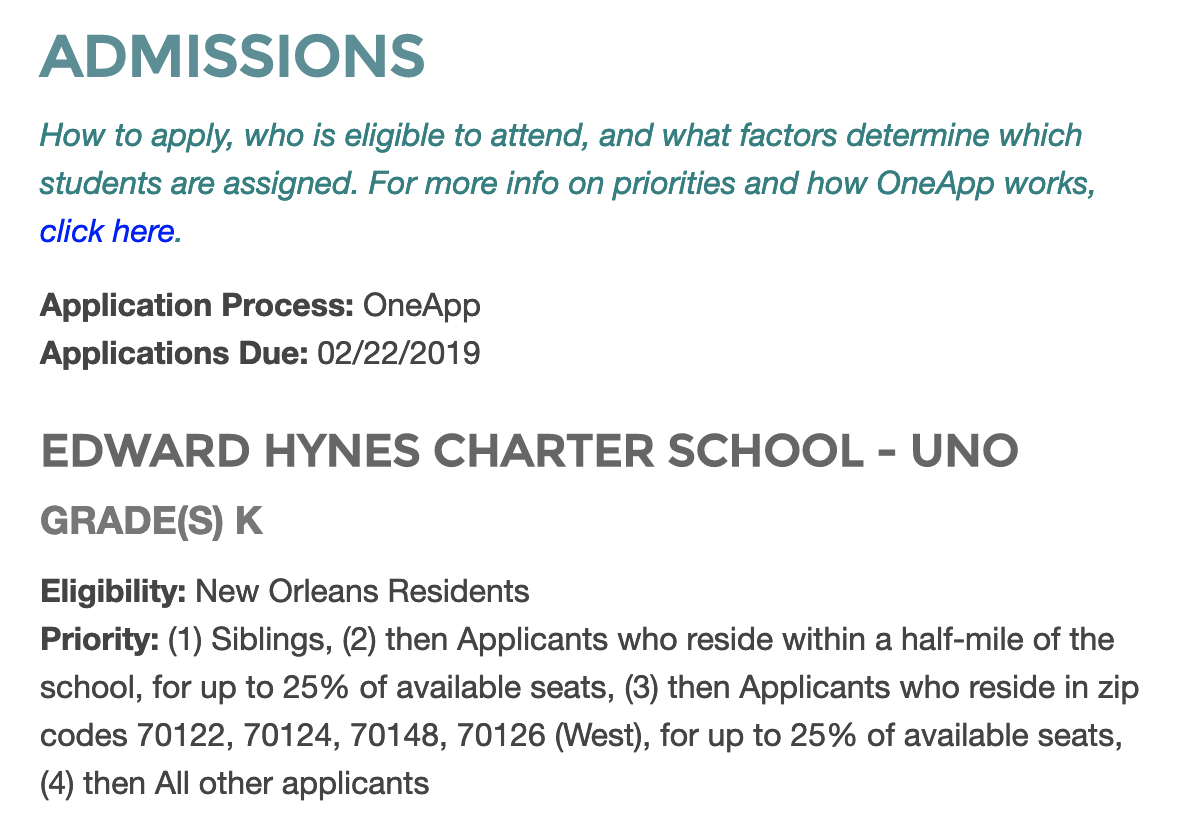
Nevertheless, you wouldn’t know this from looking at the information available about the new school’s admissions process on the EnrollNOLA website. Perhaps that’s because they’re waiting for the U of L board to officially approve the Hynes-UNO agreement, which is scheduled for a vote next Friday, February 22nd (which also happens to be the last day to submit an application through OneApp).
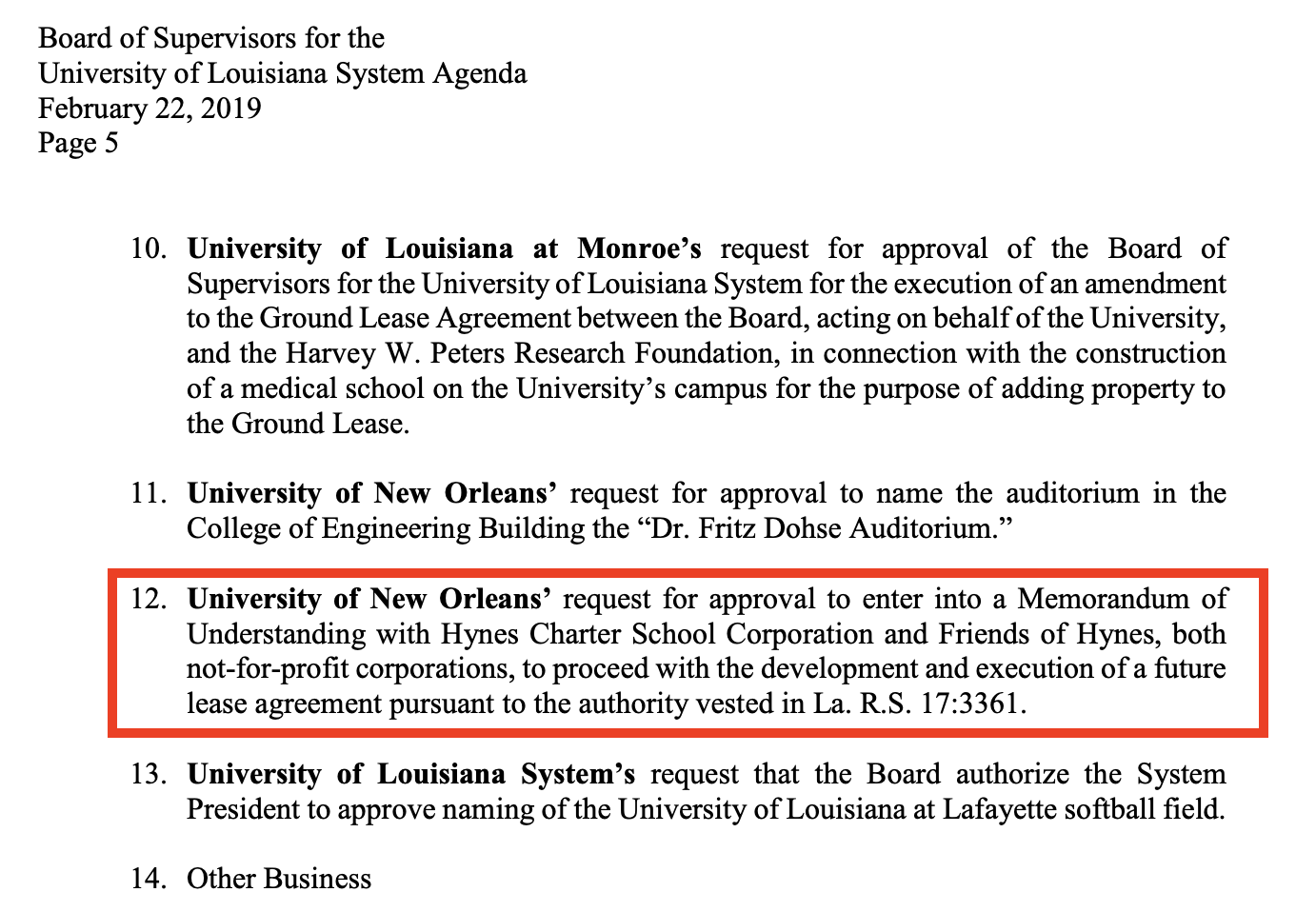
But here’s the kicker: My source tells me that Supt. Lewis, who believes he has the authority to unilaterally approve the admissions preference deal, won’t be presenting it for approval by the school board – i.e., there won’t be an opportunity for public debate and public input on the plan.

OPSB already allows Hynes to game the system
Furthermore, OPSB has already allowed Hynes tip the scales in its favor in other ways.
While district officials describe Hynes as one of the highest performing open-enrollment schools in the city, the reality is a bit more complicated. To start, the school has a free pre-K program, but it’s only open to gifted and talented students, which means the three and four year-olds seeking a spot must earn a high score on an “an individually administered test of intellectual abilities.” This also means it pretty much eliminates Hynes’ pre-k program as an option for low-income families. One added benefit of gaining entry to Hynes’ elite pre-K program is that those students are guaranteed a spot in kindergarten and you can be certain that nearly all of the families with kids in the pre-K program take Hynes up on the offer.

For those families who can’t get their children into Hynes’ pre-K program, snagging an open kindergarten seat is pretty much the only chance they have to get into the school, as very few seats open up in subsequent grades. Still, a confluence of factors end up keeping most low-income families out.
First of all, certain students get priority in enrollment, such as siblings of students currently attending Hynes. OneApp then sets aside 25% of available seats for applicants who reside within a half-mile of the school and up to 42% of available seats for students who reside in the 70124 zip code.
However, this zip code preference is unique to Hynes. OneApp generally sets aside 25% of the available seats for students within a half mile of the school and another 25% for students who live within the school’s geographic zone. So when OneApp assigns students to Harriet Tubman Charter School in Algiers, for example, 25% of the available seats will go to applicants within a half mile of the school and another 25% will go to children who live in Zone VII (in purple in the map below). The rest of the seats will go to children from across the city.

Yet when Hynes finally joined OneApp in 2017, OPSB allowed them (again, without any public debate on the matter) to opt-out of geographic zone system (they are in Zone V in blue above) and instead agreed to set aside seats for students within their zip code. And because Hynes is located in Lakeview, one of the wealthier areas of city, the students who end up in those spots tend to be whiter and more affluent than the city as a whole.
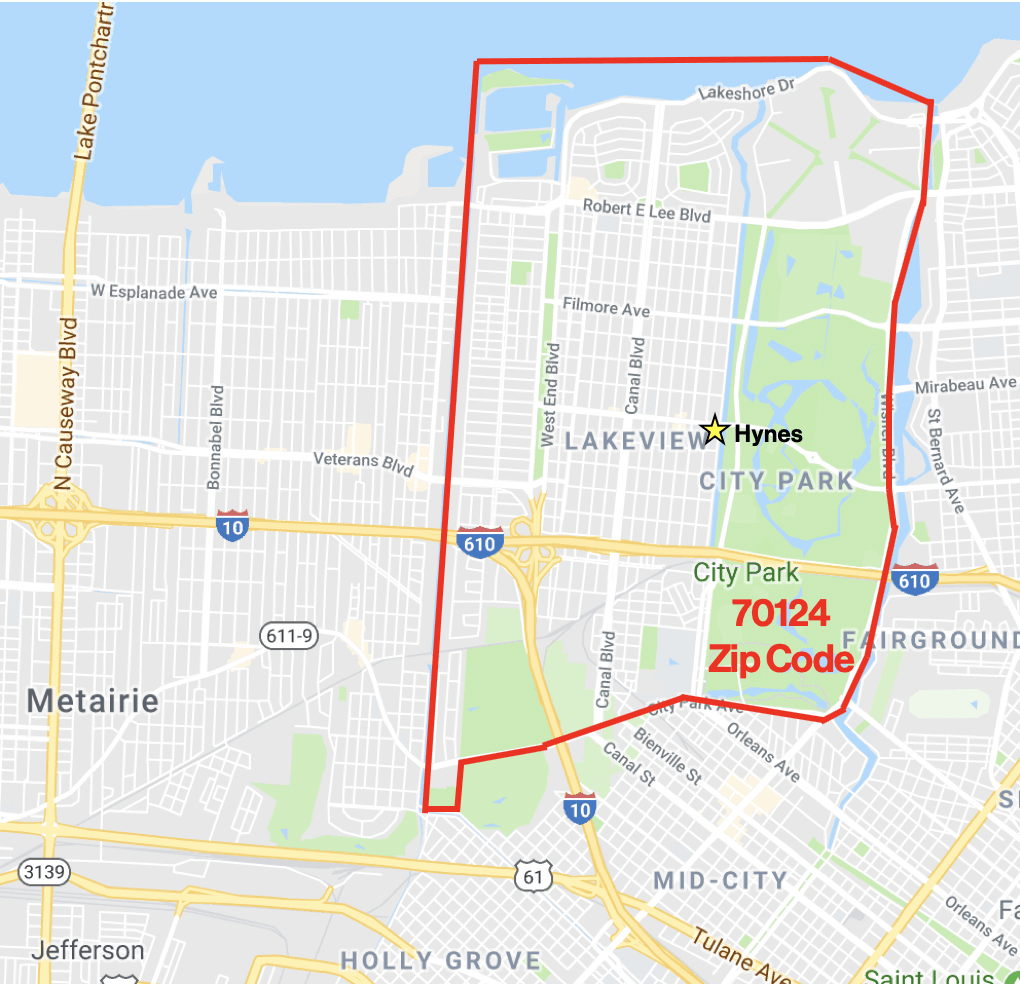
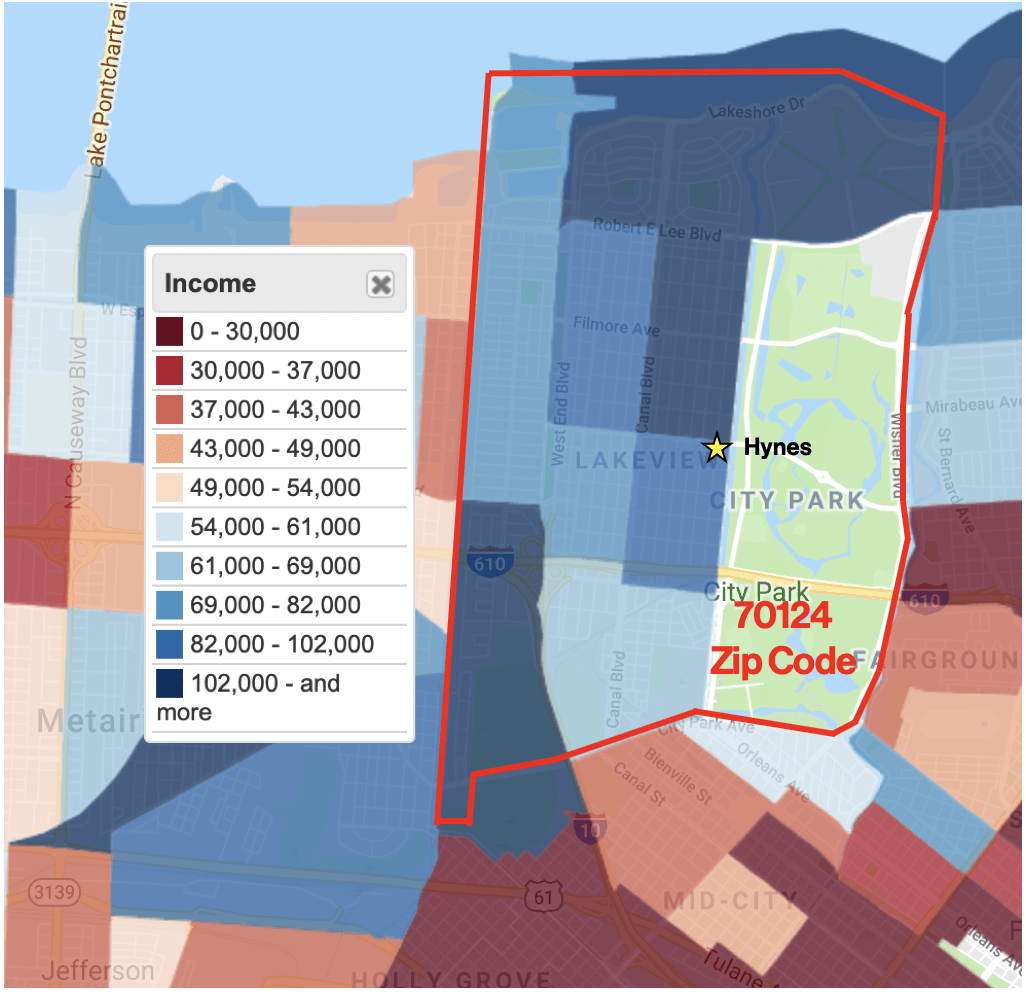
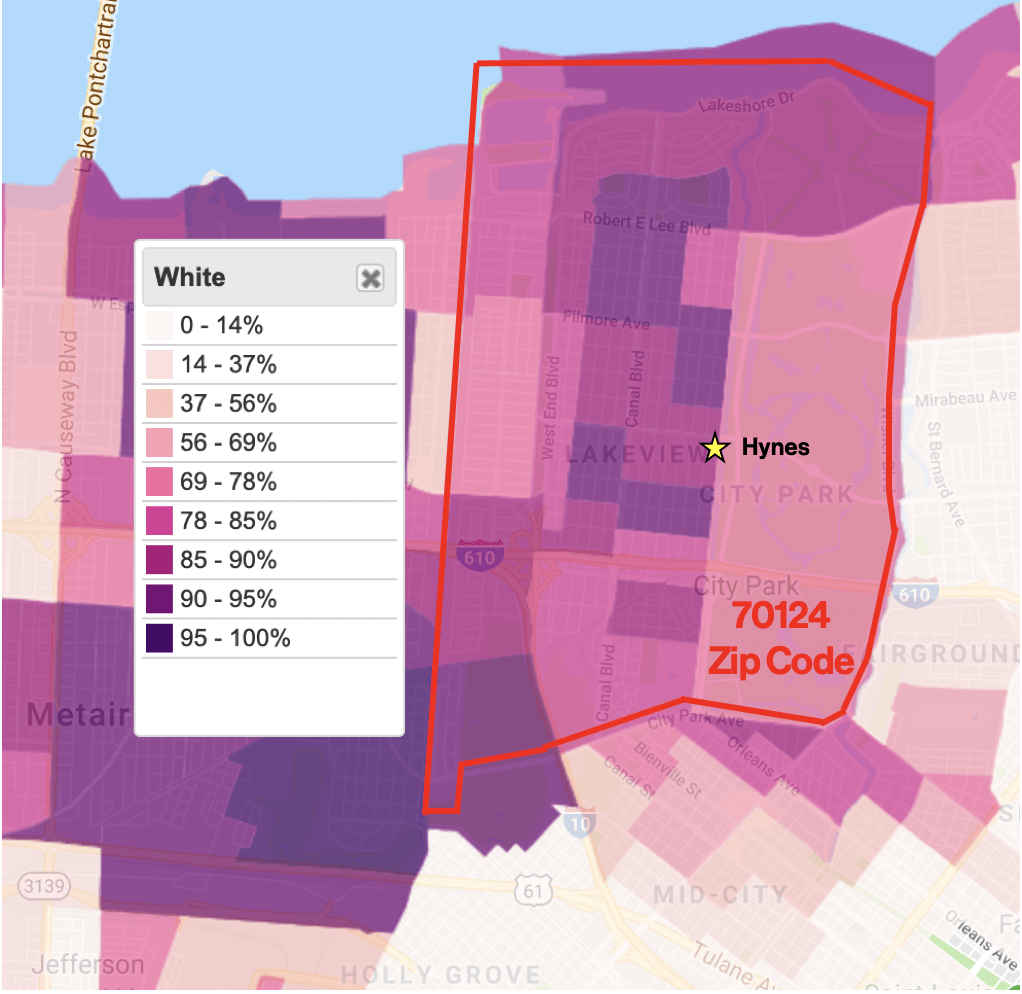
As a result, Hynes students look drastically different than those of just about every other open-enrollment school in the city. According data compiled by the Louisiana Department of Education, only 32% of Hynes’ current students are low-income, as opposed to 84% of public school students in the city as a whole. Moreover, while the 82% of the students in New Orleans public schools are African-American, only 35% of the students enrolled at Hynes are black.1
OPSB has an equity and transparency problem
Back in 2016, I wrote an article for The 74 in which I looked at why some members of the education community were wary about the return to local control. One of the main reasons was that OPSB had been slow to embrace the policies that the Recovery School District had established to promote equity, such as OneApp, the city’s unified enrollment system.
As former New Schools for New Orleans co-CEO Michael Stone explained in an interview for the piece:
“The RSD has not only demonstrated a commitment to providing equitable access to schools, but has continually looked for the next intervention that will meet the needs of the most vulnerable kids in our city… OPSB has either been apathetic about those issues or was brought into those conversations kicking and screaming.”
Given what we now know about backroom admissions deal between Hynes and UNO, those concerns about OPSB’s commitment to equity appear to be justified. The district is trying to surreptitiously ram through an admissions preference at a public school, funded by taxpayers and nominally open-enrollment, without any public scrutiny or debate.
If this is the way OPSB is going to operate, it doesn’t bode well for the future of public education in New Orleans.
- To look at it another way: Hynes alone enrolls almost 11% of the district’s white students, even thought there are approximately 80 public schools across the city. ↩
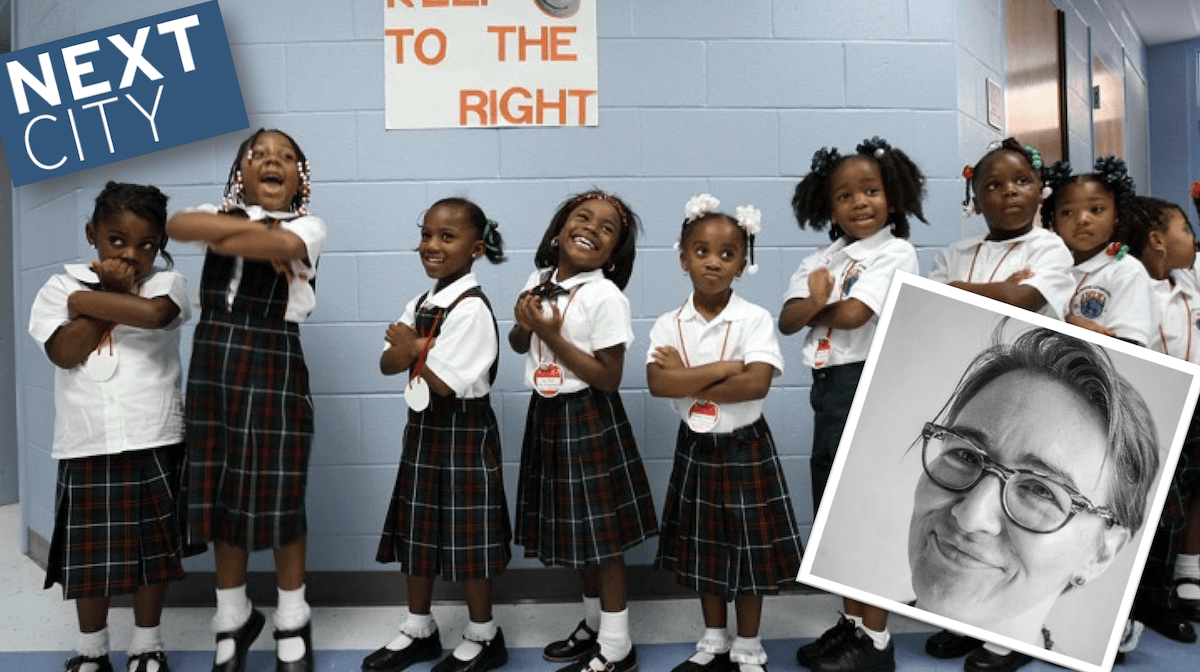

Well I, for one, am shocked.